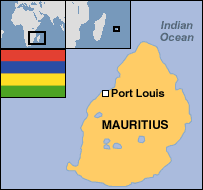 For my latest project at the Mercatus Center, I have been researching the island nation of Mauritius. Just what and where is it you might ask? I had to ask too.
For my latest project at the Mercatus Center, I have been researching the island nation of Mauritius. Just what and where is it you might ask? I had to ask too.Mauritius is a tiny island nation off the coast of Africa and boasts the second-highest income per capita in all of Africa. The thrust of my project is try to figure out why. This is part of the Enterprise Africa program.

Here are some of the fascinating things I've found about this tiny country:
 It was the one and only home to the dodo bird that went extinct by 1681.
It was the one and only home to the dodo bird that went extinct by 1681.- Mark Twain visited the island in 1896 and was so impressed by its beauty that he said, “God first made Mauritius and from it, he created Paradise.”
- The country was visited by the Arabs and Malays during the Middle Ages, settled by the Portuguese, Dutch, French, and Britain.
- The population is ethnically 69% Indian and French is still spoken by 80% of the population, despite France having lost its colonial occupation over 200 years ago.
- The religious demographics of Mauritius are approximately 50% Hindu, 32% Christian, and 16% Muslim.
- Mauritius is governed by a parlimentary representative democratic republic.
Here are some of my early thoughts to explain some of the differences in economic growth between Mauritius and the rest of Africa:
- Easy access to navigable waterways (the Indian Ocean) for trade.
- Common law heritage as a former British colony.
- Diverse population leading to decentralized political structures and civic organizations.
- Being an island of immigrants it has a lack of long-term (centuries old) ethnic conflict.
- Differing culture and religious beliefs from the rest of Africa.
- Isolation as an island country leading to fewer wars and threats from less stable nations near its borders.
To get started, here's a paper from the University of New South Wales on "The Economic Development of Mauritius Since Independence".
Additional Links:
- Library of Congress Country Study on Mauritius
- Mauritius statistical rankings compared to other countries.
- African Studies Center Mauritius Page with many links.
- CIA World Factbook
- Mauritius News
No comments:
Post a Comment